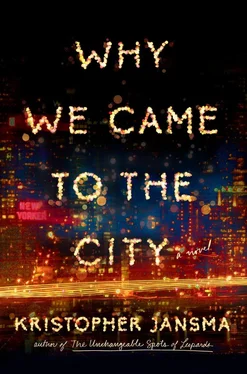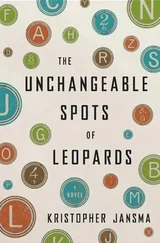You’re such a weirdo , thought Jacob as he kissed sleeping Pete’s cheek goodbye. Then he slipped out through the blank white door, which locked behind him with a click.
Jacob hurried down chilly Broadway and bustled up the icy iron ziggurat of the 125th Street station, just as the downtown number 1 train groaned onto the aboveground platform. He hardly had time to admire the view as he blew aboard just before the doors cinched shut. Morningside Heights yawned before him, and he tried to feel the immensity of the entire island, of the steel tonnage beneath his feet. He willed the whole labyrinthine mess of it to vibrate up his calves and forearms.
He had the first line— he had it —of an epic poem. Or at least it was nibbling on the little gleaming hook that dangled from his spinal cord. He reeled all the way in and recast, way out into the deep white city: the literal soul of a thousand poets who’d come before him; the fishing grounds of two thousand others who’d gotten up earlier, read longer, worked harder, breathed deeper. Still, couldn’t he just snare a little Langston? Snag some Allen or Frank? He barely dared dream of angling for Walt or for Hart — those two slippery silver sturgeons, each eighteen feet long and weighing, together, a metric ton. Guarding their salty eggs, that humble caviar. Walt, the monstrous Methuselah, with his prehistoric whiskers in the murky bottom. And Hart, the lithe Leviathan, his steel-cabled fins propelling him through the upper currents. Jacob blinked twice as the ground outside the windows rose upward on each side, and in an instant he was underground.
Though the 1 train was quiet in an early-afternoon sort of way, Jacob transferred to the express 2 train at 96th Street, hoping to move even more swiftly south to Fourteenth Street and the coffee shop that he required to sit in and write this poem. It was the only place he could breathe easily enough to tease it out. The challenge, as always, was to hold this impish idea in his threadbare net until he could get there.
Jacob’s mind traveled back to a high school biology class where, eighty pounds lighter and half as hairy, he had seen an article in a National Geographic magazine showing an African tribesman extracting a deadly parasitic worm from one of his legs. He grinned with blindingly clean teeth at the camera, as he displayed his affected leg. The onyx flesh was powdered with whitish dust, except for a circle about the size of a quarter that he’d been keeping clean. From a tiny, oozing wound emerged the freeloading worm, thick as a spaghetti strand and, according to the caption, more than four feet long , curled inside the man just beneath the flesh. The only way to extract it was to coax its little exposed wormy tail around a piece of twig. Then at a rate of one quarter-turn per day, the worm could be slowly spooled out of the wound. Any faster than this, and the alarmed worm would break its captured tail off, and the whole thing had to be started over. Between turnings, the twig and its wormy passenger had to be taped down onto the man’s leg so that he could continue to run and hunt and live.
Disgusted, fourteen-year-old Jacob had been unable to rid his mind of the image and, worse, of the idea. Ten years later he found himself haunted by it nearly every day. For this was what writing poetry had become: a delicate extraction, done in quarter-turns, where the slightest jostling meant starting all over.
It hadn’t always been that way, Jacob thought, as he slipped out of the 2 train. He hurried now, as he traversed the long white corridor between the 1-2-3 and the Brooklyn-bound L. In high school he’d written like blinking. On the backs of napkins. In textbook margins. On the edges of his desks. On the dividers in the bathroom stalls. On the chalkboards of empty classrooms. He wrote so easily that he hardly minded giving his little quatrains and sonnets away. He imagined them being found someday by younger versions of himself, who would then be inspired to continue the tradition of guerrilla poetry at Moses Maimonides Elementary School.
In college, he wrote only after four a.m., an hour he’d known intimately. He had to wait until everyone he knew fell asleep — when all excitement was over. With his friends falling down into couches and onto curbs and against the springs of others’ beds, Jacob would scramble up the nearest sturdy tree. It didn’t matter how drunk or how high he’d managed to get. He liked the feel of bark against his palms, the brush of branches on his stubbled cheeks. He liked to imagine that it was his way of tapping into his most primal self — a Paleo-Jacob who still hunted with spears and made fires with flint. But the truer reason was that he’d discovered that the fear of falling was just enough to keep him from going to sleep. More than once his friends had woken up to find him snoring in the embrace of an old oak tree’s roots on the North Quad, having barely made it down before losing consciousness but with a completed poem safe there in the tweed pocket.
In this city without climbable trees, he’d taken to early rising and writing on boyfriends’ fire escapes. And it was this way, just on the other side of four a.m., that he’d penned his great epic, In the Eye of the Shitstorm , and that, really, had been the beginning of all the trouble.
Looking back on it all now, Jacob could hardly believe he’d even attempted it. One thousand, nine hundred and thirty-two lines (in honor of the year that All Real Literature had died inside of Hart Crane, when he’d jumped into the Gulf of Mexico) and told in thirty-three sections (one for each year that Walt Whitman had worked on Leaves of Grass ). God, Jacob thought, what a pretentious little ass you were . It didn’t matter; he missed the confidence that had permitted it. Missed the fury that had blinded him to all paying of bills, all feeding of self, all sleeping at night until it was finished. It had taken him two weeks, and he’d begun to believe he’d never really recovered.
The poem had come after the suicide of his uncle Miles, a man from St. Louis who at forty-five had been able to fix anything motorized or mechanical. He had taken Jacob fishing for the first time when he was a boy out on the Missouri River. He had also been the first gay man Jacob had known. Miles had been thought to be just a happy bachelor by the rest of the Blaumann family. Only Jacob, at eight, had known the truth, after seeing his uncle embracing the shadow of another man behind a boathouse. It was their secret and Jacob had kept it, even after Miles swallowed a pharmaceutical cornucopia in the back of a Dodge Dart parked near the river.
His poem, In the Eye of the Shitstorm , was about his other great childhood idol, the only other superhero he’d ever believed in: Michael Jordan, hanging himself from the backboard of a basketball net in a Brooklyn schoolyard. The poem dipped in and out of the troubled life of the iconic athlete, circling the legend but never landing. The main character, in fact, wasn’t the great Number Twenty-three at all. Jacob’s “stroke of genius” (according to his editors at the Roebling Press) was beginning the poem just after the paparazzi and police had cleared the court of the body.
They have, in their thoughtless hurry, left behind the enormous pile of, well, shit that Number Twenty-three left beneath the basket when he’d strung himself up. A nameless janitor is brought in on a Sunday morning to remove the excrement. Most of the thirty-three epic sections, and the 1,932 lines, detailed the life of this nobody, as he makes various attempts to clean the famous man’s fecal matter from the tarmac. He eventually settles on using his hose to steadily wash it all toward a drain on the edge of the court, where the crap begins to spiral in great Coriolis circles, forming a veritable hurricane of shit, the central image of the poem.
Читать дальше












